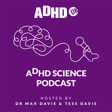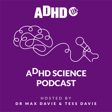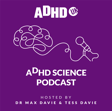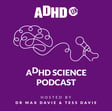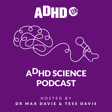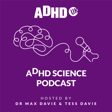Become a Creator today!Start creating today - Share your story with the world!
Start for free
00:00:00
00:00:01

Episode 21- Is Rhythm a dancer, after all? with Anders Rasmussen
Another of our episodes which comes from Max reading a paper and going 'whoa...' this one is with the very charming Anders Rasmussen from Lund.
His paper is here: https://pubmed.ncbi.nlm.nih.gov/38066477/
I am aware that the audio isn't great at the moment- I broke our old microphone and am trying to sort out a new one.
Transcript
Introduction to the ADHD Science Podcast
00:00:06
Speaker
Hello. Hello. Welcome to the ADHD Science Podcast. I'm Max Davie. And I'm Tess Davie. And I'm not in this episode. No. Well, you are. Well, I'm here now. If you're just here to listen to me talking, which I know a lot of you are. You'll be most disappointed by the subsequent half hour after this brief period of Tess.
Episode Format and Interview Challenges
00:00:30
Speaker
No you won't be disappointed because it's a great episode. It is a really good episode so what we thought we'd do with this format basically Tess is so busy at the moment that it's almost impossible to schedule a time when me and you and the guests can all do a recording together so we've kind of split it off So I have done a couple with just the guest and what I'm going to do is explain to you what we talked about and hopefully that will make it easier to then dive in for the listener okay to work out what it was. And I've got down.
00:01:03
Speaker
from the shelf where it's sat for the last 10 years.
Interview with Anders Rasmussen
00:01:07
Speaker
um man A metronome. A metronome. Why? Now, this is why. I interviewed somebody called Anders Rasmussen, who is not only the most Swedishly named person in the world, um but he also has been researching the... Well, let me explain. So what they do is they do this.
ADHD and Rhythm: Study Insights
00:01:25
Speaker
They basically play to people with ADHD or without ADHD,
00:01:32
Speaker
ah regular rhythm okay for a period of time so you get kind of entrained with the rhythm and then you stop and then the person has to continue the rhythm not tapping on a table in this case but tapping on the phone right and what they looked at is whether people with ADHD were better or worse than normies as we that's the technical term we cannot normies we have that right um whether they're better or worse than normies at uh maintaining the rhythm over time so what would you what would you suspect oh that's a really good question i'm gonna say better
00:02:22
Speaker
incorrect. oh So people with ADHD are worse. And I think partly because we tend to speed up. Right. We also tend to be less consistent with the the rhythm because we get distracted in the two beats as well. So the important thing about this is not, this isn't, you know, in some ways you would think this is just a bit of a curiosity, but of course,
00:02:49
Speaker
One of the things, it's because it's such a simple thing to do, I was able to do it with just, you know, you could do it with a phone, obviously, quite easily, but we haven't had a metronome in the house. um But you could do it very easily on an app.
00:03:02
Speaker
um and then measure the response times and essentially what they're looking at is this is quite a good test it's quite a good screening test for ADHD whether you can maintain this rhythm I'm just thinking about the fact that both of my brothers have ADHD and are dramas yeah I did point that out But I think, yeah, it's interesting, um but I think with it as ah as a drummer, maybe you train yourself out of that. I mean, drumming is a very stimulating experience, which is why I think a lot of people with ADHD are attracted towards it. i used to draw
00:03:41
Speaker
Yeah, and you don't spend a lot of time drumming. I know you spend some time drumming, not drumming, but most of the time you are drumming. You're not waiting. Do you see what I mean? I don't know, I don't drum anymore. But this is this is not this is not what you're doing is is sort of almost waiting for something that's not there to give you a cue rather than if you're drumming, particularly in a band.
00:04:00
Speaker
you are drumming along to something that's that's kind keeping you in in check.
Potential of Rhythm Tests in ADHD Diagnosis
00:04:05
Speaker
Anyway, this isn't necessarily very interesting concept, very interesting test and potential has got real potential, not, you know, not proven yet. And they're going to do some more stuff all as a possible screener or helpful, you know, additional thing for ADHD diagnosis. And we, you know, we need it because we are really struggling worldwide with a volume of people who want to be assessed. So any tool that will be helpful for us um will be super helpful. And also it might be helpful for things like medication response and and and and so on. So what would, if if you had to try and explain why that happens?
00:04:43
Speaker
why people with ADHD are worse at maintaining a rhythm yeah that they are not hearing. I think it would be a combination of being a bit impulsive, so having a tendency to want to get on with the next beat, yeah but also being... yeah We talked, didn't we, ah with Andrew Hague, about how attention cycles very rapidly, and I think some of those micro inattentions, the kind of What I mean is, because in attention you can think of as, oh, I i concentrated on something for 30 seconds and then I got distracted for 10 seconds, but it can be faster than that. You can be concentrating on something and then very, very quickly be distracted, then come back to it at that very sort of microsecond level. That's what Andrew's work kind of was looking into.
00:05:32
Speaker
So it may be that some of those micro distractions or micro inattentions are contributing to the fact that people are not as good at this if they have ADHD. You know who would be really good to talk to about this? Who's that? The person in the episode. Let's talk to Anders Rasmussen about this very topic. Well, you can do that. Yeah. Okay. I'll do that. I was at work when this was recorded. You were pulling pints. All right. See you a bit. Bye.
00:06:01
Speaker
So Anders, welcome. Welcome to the ADHD Science podcast. Thank you. um So we're we're going to dive straight in because it's such a fascinating area that you've been researching.
Cerebellum Research and its ADHD Connection
00:06:13
Speaker
What was the question that you were answering when you did your research that we're talking about today?
00:06:21
Speaker
Well, so I mean, the i'm I'm interested in ah the road. so So my niche has been the cerebellum for for and since I did my PhD. I've been studying the cerebellum, which is you know there they another name for the small brain, but which actually has 80% of the brain's neurons in it. um So yeah, that's something many people don't really know, but it has lots of people. So just to give people, just to orientate what people where the cerebellum is, it's sort of the funny bit on the back of the brain that sort of looks a bit separate, but isn't. Exactly. Yeah. Yeah. It looks like ah like a like a small brain, like on yeah their nice the the ah big ch and and underneath Underneath the hemispheres. Go on. Yeah.
00:07:13
Speaker
Yeah, so so and so just to give you some background, I mean, I have a background in psychology myself, but then I moved into sort of hardcore neuroscience doing neurophysiology. But I i always maintain sort of an interest in psychology. And then after studying the cerebellum for many years, we were approached by a psychiatrist who had who had read some studies showing that yeah kids and adults with ADHD have, ah there's some morphological differences if you look on average in like brain scanning and stuff like that. And one of the areas so that had the biggest differences was the cerebellum. So then his idea was,
00:08:04
Speaker
Do you have any sort of tests that measure cerebellar function? And could that maybe be used for diagnostic purposes or um to find out more about ADHD and um what what it means in terms of neuroscience? um So that's where we came from in a way. So let's let's let's wind that, and that's great. Let's wind that back a little bit. What does the cere, for people who are not don't have a neuroscience background or a psychology background, even not let alone both. um What does the cerebellum do in normal function? What's it for? Yeah, good. So a good question. And something I often forget to to talk about. But so if if you would open like a psychology or a neuroscience textbook and read about the cerebellum, it would say that it's important for balance and motor coordination. Okay.
00:09:02
Speaker
So if if you would have a sort of someone who had a cerebellar stroke, for instance, um what neurologists would do is to to ask them to close their eyes and point to their nose like this. And ah then they have this ah they would often miss their nose, for instance. So they have this problem with proprioception, sensing where your body is in space in a way. yeah i um And that's of course very important for balance. So so they often have balance problems.
00:09:39
Speaker
um And that's sort of what you get if you open a textbook, but the the the research has moved on. And it's quite clear. I mean, you can look at what other parts of the brain the cerebellum is connected to. And then you'll find, yes, it's connected to the motor system, but it's also connected to all you know cortical areas that are involved in sort of cognitive functions. And more and more research is showing that to these cerebellar patients, yeah, they have obvious motor symptoms, but there there's also many cognitive symptoms. can And now I'd say the whole sort of cerebellar community of researchers are, I mean, there's a consensus that in the same way that the cerebellum helps the motor system, it helps sort of how you think and um in the same way that you can get
00:10:38
Speaker
uncoordinated motor movements, you can get uncoordinated cognition in a way. that's what does I suppose that sort of answers to what my next question was going to be, which is that, yeah, if you take a cerebellla away your cerebellum away, you obviously remove your a lot of your motor coordination, but what does it do to you cognitively if it doesn't work properly? Yeah, so sue ken there is this um syndrome called which was say coined by Jeremy Schmanman. He's sort of the the yeah the the first one who identified that cerebellar patients don't just have motor symptoms.
00:11:22
Speaker
And so he coined this dysmetriol thought, which is, which is ah yeah, that that you have uncoordinated cognitive symptoms, basically. And that that extends to emotional patterns as well, that you you can sort of, the same way you can overreach with a movement, you can overreach with an emotional reaction, or or like go too far, or and um I mean, soundsing global in h d every time you every time you kind of reiterate it, doesn't it? Yeah, it does. So it's very similar to ADHD. Now these findings came to that people with ADHD have actually pretty big differences in the cerebellum on on average. um But yeah, it's it's sort of, but it's a neat story in a way. It is a neat story.
00:12:16
Speaker
Um, and so just, so then just to check, so that's the sort of cerebellum you're like, well, okay, very interested in the cerebellum and ADHD. And then the psychiatrist said, okay, what can we do in terms of. Practically testing this. So what, what was the suggestion and, and, and, and what did you then test? Yeah.
Finger Tapping Test Explained
00:12:33
Speaker
So, um,
00:12:37
Speaker
Then we had a few sort of tasks that we've done that I've done for a long time that we know from other research is ah sort of dependent on cerebellar function. It's not just the cerebellum, of course, it's really hard to find tasks that just sort of tap into one brain function. But yeah, because it's so interconnected. That's just to reiterate that. Yeah.
00:13:03
Speaker
um So as I mean, you always have to be careful with which conclusions you drop. But what one test that I've been doing for 16 years is eyeblink conditioning, in which so maybe you've heard of it. but Basically if you would hear a tone and then shortly after you get a puff of air in the eye. Okay. And at first you would just blink when you get the puff of air in the eye because of the blink reflex. But if you repeat this many times and then you learn to blink when you hear the tone. Yeah. So it's sort of a very simple form of associative learning. Yeah. And there's tons of research showing that the the cerebellum is crucial for this. So if if you remove
00:13:51
Speaker
the cerebellum, you won't be able to do that. And you can also look at cerebellar patients and so on. Okay, so that's, that's one task. And then you have another one called finger tapping. Yeah, yeah where you have to maintain a rhythm. So then, if you were tested in finger tapping, you would hear this metronome, basically, bum, bum, bum, and then you try to sync your movements to this one.
00:14:17
Speaker
And then the sound goes away and you have to continue for like a minute. Interesting. Yeah. And how long do you have to, I mean, the the so, well, let's, let's go, let's go. So how long do you continue to tap on the finger tapping one? How long? it's Approximately. I mean, you you can do different amounts of time and that has been tested ah for in our studies, we did one minute approximately. Interesting.
00:14:47
Speaker
And the, ah so tell me again, with the I blink, if you have cerebellar dysfunction, you is it that your you don't condition as effectively to the to the puff of air? Yeah. Yeah. So you're ah you're less likely to blink to the sound alone if you have a cerebellar dysfunction. Yeah. Okay. So those are Good. Those are very simple, particularly the finger tapping. That's the one that really excites me because it's so, so simple. You can do, you just, you know, you could do it with a laptop and a, and a pencil. exactly yeah I think it's a bit more difficult to. yeah Yeah, exactly. But that's the one that really excites me for as a clinician really excites me. So what do you find when you, when you look at those differences in those tests between ADHD and non ADHD people?
00:15:39
Speaker
Yeah, so I mean, we we we did this and then you can look at several different sort of outcomes in finger tapping. So you can look at the sort of average tapping rate and you can I mean, you can look at that when you have the tone on, see if they can sync their movements to the tone. And um and also after the tone has stopped and see if they sort of do they accelerate their pace or do they maintain the same pace?
00:16:09
Speaker
um And then you can also look at the variance in tapping, right? Yes, I was wondering about that. So I mean, you you might be able to um and and actually often see that after the tone stops, even controls will sort of increase their pace over time. So they they have a target of 524 milliseconds and most people are pretty good during the synchronization phase when they hear the tone but then most people try to speed up slightly ah during the production phase we call it when when there's no sound. Yes and it's a bit like that if you've ever played a game where you will
00:16:53
Speaker
um have the title of a song and you have to kind of know when the the actual the the music, when the actual singing starts and you have to kind of press a button when you think it's going to start. It's sort of a bit like that. You've got to think it in your brain. I mean, that's not quite the same because you've also got to know how many bars and how many, you know you' but know the song really well. But but it's it's not dissimilar to that kind of thing. And so it was really interesting. So what what were the So what was it specific what was specific about the ADHD population's response to this test?
Implications of Tapping Test Results
00:17:29
Speaker
So in in the in the finger tapping, we saw effects on, the biggest effect was on the tapping rate during the production phase and the variability during the tapping, the production phase. So when there was no sound. So it was both that they had a higher, you know, it tapped quicker
00:17:51
Speaker
uh, during the production phase. And that's even, so I mean, I should say that, uh, some, some people that we tested and especially in the ADHD group would go like, uh, they would lose interest. Even if it was just a minute, they would like eventually go down to like 200 milliseconds. they order do to dooo yeah yeah Yeah. And that, so we removed such trials because that was interesting. Yeah.
00:18:18
Speaker
That would be boredom, I would say. And your your subjects, were they adults? No, this was kids. And how old were they? So it was between nine and 15, I believe. Okay, so that's a pretty yeah really good age to be testing. And we're testing on adults right now as well. And we see we see effects there as well. Yeah. um Is it different in adults?
00:18:44
Speaker
It is. so there's And there's some effects that we saw in kids that we did not see in adults. But this one, I think the tapping rate still pans out. So there there we have the same pattern. But i yeah, I have to revisit the analysis on that one. And we're not completely done. so no Sure. I'm not asking you to kind of reveal unpublished data. but I'm just curious.
00:19:09
Speaker
um So it's making me think of other continuous performance tests that happen in ADHD. So there are things like the QB test, which is very, very common in the UK. I don't know if it is in Sweden as well, but it's absolutely huge over here now. And I'm not massively convinced that it should be just the cornerstone of all practice, but it is useful at times.
00:19:36
Speaker
um Because they also manage, they also, in a sense, because that's a test where you either test, you either press the space bar when you should press the space bar or don't when you shouldn't for whatever rules have been set up. And the the the thing that strikes me is that this is a bit like those kind of omission, commission errors that come up in the ah QB test and also um the variability really kind of, because that really, I think that's really interesting, the the variability
00:20:07
Speaker
And the way that ADHD people will kind of have micro absences of attention and then come back. And that's where the variability comes from. is if I would probably say um that kind of refoc the need to refocus um that kind of loses you or gains you ah cognitive time. um So how good, because the QB test is is sold as a test. And again, skepticism is relatively high for me. is this ah but Is this a plausible test or is it just a piece of information that you think would be useful for a clinician who's trying to put things together? so I would say more the latter. and i mean We do have the tester talking about this used not everywhere in Sweden, but in many places in Sweden as well.
00:21:01
Speaker
And, uh, I mean, we, so we also compared, uh, finger tapping in this case. Oh, okay. who' that test And so the, the finger tapping, at least in this study and did have better like specificity and sensitivity, um, and the QB. Yeah. But, uh, okay. But it's not, I mean, it's, it's 29 kids. So, I mean, I don't want to sort out the contusions and so on.
00:21:30
Speaker
um And I also, I mean, i so I've been asked so about this by several journalists and I don't see this as something that we could just do this and then, you know, distinguish diagnosis based on only this. I mean, yeah one needs to be really careful, which I think is where my skepticism about about continuous performance comes in, because it's not that it's not useful. It's just it's not but' give a cool picture, right?
00:21:58
Speaker
What would you do if this was suggestive of ADHD, but nothing else was? Or conversely, if everything else pointed to ADHD, but the person was absolutely perfect on this?
00:22:10
Speaker
um wait Sorry, can you repeat that question? so i suppose um let's Let's rewind a little bit. so You're saying that it's more of a piece of information rather than a test. yeah so um ah and I suppose I'm bringing in my own cots, you know, skepticism, not about continuous performance being a useful addition to a clinical assessment. But my skepticism, it's my skepticism that it should be a determine whether you can make a diagnosis or not, that should be the one reason, you know, why you do or don't give a diagnosis. And, and for me, it can't be that. No. um And I suppose so you agree. like um But I suppose the question, go on.
00:22:55
Speaker
Yeah, no, i I mean, I just completely agree. And I mean, it has been here in Sweden as well. There has been this, I guess, politicians have, I mean, they're, they're searching for a screening tool. Yeah. um And I would not want to sell this as such. No, I mean, it should be just a piece of information. And what I'm, what I'm also hoping is that it can be useful for for clinicians, maybe to, in the end, sort of ah find differences within the group of ADHD or something. Yeah. So, oh gosh, there's so many different things.
Future of Finger Tapping in ADHD Assessment
00:23:40
Speaker
There's three different questions that I want to ask you all at once. ah First of all, what is the specificity and sensitivity for detecting ADHD? Bearing in mind that we're not going to use it as a as a sun standalone test.
00:23:55
Speaker
But what what what from this, and also bearing in mind it's a very small study, but in that study, what did you find? um So are are you searching for the exact numbers here? Or was it 0.85 or 0.9? And then so we could, when we combined the different cerebellar tests, we got slightly higher, but we were also, since finger tapping is such a short and quick and easy test, ah we we sort of investigated that one the most. And yeah that one on its own had very high.
00:24:32
Speaker
Yeah, it's very good, basically. yeah it's yeah But we're not going to... And is it is it commercial is it going to be commercially available? I mean, no, it's just finger tapping, but you need to have the timing and the detection of it. And is it commercially available? Will it be commercialized in that way? So i so I'm collaborating with...
00:24:56
Speaker
with some researchers in the Netherlands. And so the answer is ah we're working on it. And but we would I'd say we need to do some more testing and at a larger scale, but we're looking at maybe building it into sort of a mobile app, ah which could be done. So you know yes, you very good. in In a mobile phone. And that would be Yeah, with a touchscreen. Yeah, that's such a great idea.
00:25:25
Speaker
And again, we're not looking for the magic screening test that's going to tell everyone who that whether they're putting ADHD or not. We're really not. I agree. we're all but We're both on the same page about that. But you did mention something really, really, really interesting, which was um different subcategories of ADHD, because I think you mentioned that in the paper. um You mentioned DAMP, and we need to talk about a little bit about that.
00:25:51
Speaker
um And so what do you find there and and and what do you think it could be useful for there? So I mean, the dump is sort of an old term that has, I don't know, did you have that in the UK? No, but it's famously by, is it Chris Gilberg? that He's a Swedish psychiatrist, so he came up with it. I think it's been i think it's something that people are aware of in the yeah UK, but it's it's not really diagnosed.
00:26:16
Speaker
I think it's it's been, well, explain what it is well this is. Well, one of us will explain what it is. It's basically, I mean, i the way I think about it, it it's ADHD plus sort of motor coordination issues.
00:26:31
Speaker
um And it's sort of, I mean, the way the psychiatrist I work with see it, it's ah sort of the more difficult form of ADHD in a way and more yeah um Yeah, the people who are super hyperactive and so on tend tend to have that. They tend to have motor coordination difficulties as well. yeah like Exactly. Interesting. And for the finger tapping test, we saw that they were the ones who had the most difficulty as well. Yeah, which makes sense because, of course, you've got somewhere which is something which is cut which is testing the cerebellum. The cerebellum is ah very important for motor coordination. You have motor coordination difficulties in ADHD. It sort of makes sense.
00:27:15
Speaker
But I suppose the flip side of that is that even if you don't have motor coordination difficulties, even if your motor coordination is fine, as whatever fine means, if you have ADHD, your finger tapping is going to probably be different. Yeah. Yeah. That's, I mean, that's what we saw because we also saw a difference between the people or the kids with ADHD who did not have motor coordination problems um and controls. Yeah.
00:27:45
Speaker
Exactly. So it's not just about the motor, it's not just an artifact of the fact that kids with ADHD are more likely to have motor coordination difficulties. I suppose that's another yeah objection or kind of weakness that you've kind of um controlled for.
00:28:02
Speaker
um So what what, as a clinician, as someone who diagnoses ADHD, what does this mean for us for for for the people looking after children particularly, but also adults with ADHD. What what what are the implications of this?
00:28:22
Speaker
So, I mean, at the current moment, I wouldn't say there's many implications, but I mean, as I hinted at before, my hope is that this would sort of, that you could use this as a part of of the assessment. And maybe um if you do this and it doesn't take a long time, and then you follow these people these ah the the kids who get the diagnosis,
00:28:47
Speaker
or the patients and maybe you see sort of that they differ in some way that could be helpful in terms of I mean ultimately what we want to give all the kids is the help that they need right and I don't know if you agree I mean you probably know more about this than me but ADHD at least in Sweden I would say is very It's a very heterogeneous group and in this group you have some individuals who who needs adaptations in school or at home. You have ah people who need medication and who really benefit from medication.
00:29:26
Speaker
um So there's different ways of treating and right now I think You have to try the different ones in in a way. ah ah yeah I don't know if you agree with that but that. No, I mean, yes, I absolutely do. And I don't think anyone who's listened to any of my episodes would would would um would doubt it. um Yeah, I mean, I think it's highly heterogeneous. um I think the thing that your work says to me specifically is that we mustn't forget the motor coordination and the
00:30:02
Speaker
the praxis aspects of ADHD. So what I mean by praxis is the kind of planning, just for you, not for your benefit, for the audience benefit. What I mean by praxis is the kind of, as I understand it, the sort of planning of things, the getting from where you are to where you need to be, which is often impaired in ADHD, often in the absence of coordination difficulties. Still, planning stuff is hard. And the cerebellum is really important for praxis, as again, as I understand it.
00:30:31
Speaker
So it's reminder we can get... so I'm sort of answering my own question. I'm sorry. if I think it's because Tess isn't here. I'm unleashed. ah um The dog is also barking, which is annoying me, um which is a theme of the podcast. So that's fine. um the um Hang on. I'm i am going to pause just to so two seconds. Yeah, he's just hungry. It's fine.
00:30:58
Speaker
um So I suppose what I was going to say is um we've often had a few neurologically of ADHD, which is very focused on the frontal cortex, very focused on the prefrontal cortex and inhibition and, you know, that sort of thing. And I've always been a bit skeptical of something which is so reductive because you find changes in the brain all over the place, don't you?
00:31:30
Speaker
yeah So I think it's really important, part you know apart from all the fascinating stuff about the finger tapping itself, to to think about um ah cerebellum, just other parts of the brain, which aren't the frontal contexts, cerebellum being one. But um i just you know just a reminder that this is a neurologically diverse condition, with which which is with involvement all over the brain, I suppose, is where I would kind of go with it.
00:31:59
Speaker
Yeah, no, I agree. And I mean, one, now I'm a cerebellar researcher, so I'm sort of biased. Yes, of course. I mean, one one sort of ah metaphor that we like to use is that the ah the cerebellum is sort of like the the x-ray at a hospital. It's like yeah all the different departments need it. And when when the cerebellum doesn't work, then all the the different parts of the brain that it sorts of it. Excellent. Yes. So yeah yes, nothing quite works without them. Yeah, exactly. like yeah I suppose there's lots of other things that the hospital doesn't work without, then like the porters.
00:32:41
Speaker
um can't go anywhere without the porters working. They're gone. You're all screwed. um Yeah, okay. I like that analogy. um and i Yeah, and I think that's right. and and it's It's a really good reminder that ah of the importance of motors motor I think it is it is striking how often it's forgotten in ADHD assessments and in and in the management. um Okay.
00:33:10
Speaker
and what
00:33:13
Speaker
What does this mean for young, for people themselves, for young people themselves? in Are there any implications for ADHD people themselves to this work yet? Or is that something that you think we need to wait for?
Future Research and Broader Testing Plans
00:33:27
Speaker
Yeah, I think we need to wait for that. I mean, I wouldn't. yeah know I don't think so. Not right now. No. Except you might be less good at rhythm games on the, you know, there's quite a few games out there. You might just, you might just not be as good at yes you as your mates at them.
00:33:42
Speaker
at this point. um Yeah, was it her we We Music? you that's that That dates me. That's quite a few years ago now. um But there's lots of stuff on the switch, isn't there? and And kind of, you know, Guitar Hero and Drum Hero and all that. Yeah, exactly. Yeah. Yeah. yeah um So you're not going to be as good at that stuff. That's okay. But I but i think that it underlies a really important point. And I suppose my other my final question um is, what's next for you? What's next for your research?
00:34:13
Speaker
what are you what What are the questions that this has led you to go, OK, well, what now? So yeah, multiple things. So I mean, one thing we're looking into is try to see if we can build this into a mobile app and then test on ah on a much larger population and see if the the results still pan out and look in adults as well. um um So that's that's one thing. Then um we are also looking into ASD, ah which is, of course, so okay rather sort of another diagnosis. and
00:34:52
Speaker
at least here in Sweden, you have a lot of comorbidity between ADHD and AST. That comes up an awful lot in the podcast. Yeah. Yeah. And I mean, you also have studies similar to the ones in ADHD, where they've shown that ASD, there you also see quite big differences in cerebellar morphology. um So we want to study them and see sort of How do people with ASD only perform on finger tapping? How do people with comorbid ASD and ADHD perform and compare to ADHD? And also look at how how does medication affect performance here? Yes, I was wondering about that as because you've got potential for this to be a useful therapy marker.
00:35:44
Speaker
Potentially, if it's really that simple, it really doesn't take it does take that long and it can be done on a mobile app, that really could be quite significant for you in the longer term. Yeah, exactly.
00:35:55
Speaker
And then I guess the last thing that we're also looking into is doing some some brain scanning and seeing if we can actually, ah so using a high high resolution and MRI machine and see if, can we sort of correlate ah the performance on on these these tests with the the morphology of not just the cerebellum, but the but the brain. Okay. um And just to kind of bring it back to the the the anatomical side of things.
00:36:25
Speaker
um Yeah. Well, I mean, ah amazing stuff. and And thank you so much for for sharing it with us. I mean, I think it is, as you say, the fairly small first study of something, but it just absolutely knocked my socks off. I'm like, wow, we could do that. That would be so great. um So I'm so excited to see what you do next. And I'll i'll try and well,
00:36:46
Speaker
You don't do social media. I don't do social media anymore. So we'll have to just keep an eye out for papers. um But but do do get in touch if you want to come on and talk a bit more about your work, if it's gone any further. And if you want to basically just, you know, show off about this great thing you found, which is so exciting for me.
00:37:06
Speaker
Yeah, no, I will. and And I want to say thank you as well for reaching out. it's ah I haven't done this before, but it was fun. And yeah, I hope it was interesting. You were great. And you even listened to me starting to kind of go off on one ah in the absence of Tess.
00:37:27
Speaker
Um, and, and you managed to cope with the dog being annoying and me needing to change laptops and halfway through as well. But anyway, apart from that, it's been brilliant. So thank you very much Anders. Um, and, um, we'll speak to you again soon. We hope. Thank you very much. Yeah. Thank you, Max. Bye-bye.
00:37:46
Speaker
Right. Right. That was the episode. One day we will get you back on an episode. You say that like it's going to be years. It will probably be like a month. It will be. You're working so hard. Thank you. such long hours thank And you're doing exciting kind of.
00:38:01
Speaker
I don't want to say teenage things because you're barely a teenager anymore. Excuse me? You are 18. Listen, I have a few years of youth to hang on to. OK, well, you're going to go off and do exciting things to your friends in Birmingham. Yeah, I'm going to the Charlie XCX brat tour. Very, very good. Extremely, extremely excellent.
00:38:19
Speaker
The sort of place that I would not be able to be seen, even though I'd really like to go. Yes you would! You love that album, don't lie! I do love that album, but I think I would feel so out of place going to it. Well you'd be fine, I'm sure there'd be a lot of supportive fathers there. Yeah, I suppose there probably would be. Anyway, brilliant album, listen to it, I thought everyone has.
00:38:37
Speaker
Guys, if you are listening to this podcast, that means that you would love Bratz, the remix album. The remix album is particularly good. um Anyway, that's not what we're here to talk about. It's not a music podcast. That may be something we can do. Oh, God, no. A little spin-off. Right. Only two non-musicians in the family. Yeah, actually. Anyway, so we will see you next time, which shouldn't be too long because I've i've got another recording in the bag and it's just a question of pinning Tess down for 10 minutes.
00:39:05
Speaker
Also, check the socials, always check the socials. Go on our Facebook page. And I will, we're probably gonna try and do another Q and&A at some point, because that was really fun. ah And that's a lot more flexible time-wise. Yeah. All right, speak to you later, bye! Bye!
